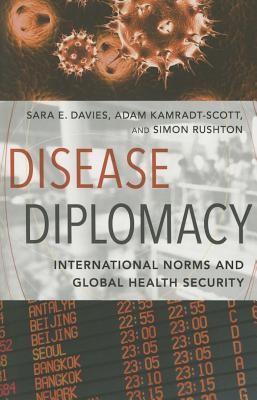
- We will send in 10–14 business days.
- Author: Sara E Davies
- Publisher: Johns Hopkins University Press
- ISBN-10: 1421416484
- ISBN-13: 9781421416489
- Format: 15 x 22.6 x 1.5 cm, softcover
- Language: English
- SAVE -10% with code: EXTRA
Reviews
Description
Have the revised International Health Regulations allowed states to rise to the challenge of delivering global health security?
In the age of air travel and globalized trade, pathogens that once took months or even years to spread beyond their regions of origin can now circumnavigate the globe in a matter of hours. Amid growing concerns about such epidemics as Ebola, SARS, MERS, and H1N1, disease diplomacy has emerged as a key foreign and security policy concern as countries work to collectively strengthen the global systems of disease surveillance and control.
The revision of the International Health Regulations (IHR), eventually adopted by the World Health Organization's member states in 2005, was the foremost manifestation of this novel diplomacy. The new regulations heralded a profound shift in international norms surrounding global health security, significantly expanding what is expected of states in the face of public health emergencies and requiring them to improve their capacity to detect and contain outbreaks.
Drawing on Martha Finnemore and Kathryn Sikkink's "norm life cycle" framework and based on extensive documentary analysis and key informant interviews, Disease Diplomacy traces the emergence of these new norms of global health security, the extent to which they have been internalized by states, and the political and technical constraints governments confront in attempting to comply with their new international obligations. The authors also examine in detail the background, drafting, adoption, and implementation of the IHR while arguing that the very existence of these regulations reveals an important new understanding: that infectious disease outbreaks and their management are critical to national and international security.
The book will be of great interest to academic researchers, postgraduate students, and advanced undergraduates in the fields of global public health, international relations, and public policy, as well as health professionals, diplomats, and practitioners with a professional interest in global health security.
EXTRA 10 % discount with code: EXTRA
The promotion ends in 16d.11:30:23
The discount code is valid when purchasing from 10 €. Discounts do not stack.
- Author: Sara E Davies
- Publisher: Johns Hopkins University Press
- ISBN-10: 1421416484
- ISBN-13: 9781421416489
- Format: 15 x 22.6 x 1.5 cm, softcover
- Language: English English
Have the revised International Health Regulations allowed states to rise to the challenge of delivering global health security?
In the age of air travel and globalized trade, pathogens that once took months or even years to spread beyond their regions of origin can now circumnavigate the globe in a matter of hours. Amid growing concerns about such epidemics as Ebola, SARS, MERS, and H1N1, disease diplomacy has emerged as a key foreign and security policy concern as countries work to collectively strengthen the global systems of disease surveillance and control.
The revision of the International Health Regulations (IHR), eventually adopted by the World Health Organization's member states in 2005, was the foremost manifestation of this novel diplomacy. The new regulations heralded a profound shift in international norms surrounding global health security, significantly expanding what is expected of states in the face of public health emergencies and requiring them to improve their capacity to detect and contain outbreaks.
Drawing on Martha Finnemore and Kathryn Sikkink's "norm life cycle" framework and based on extensive documentary analysis and key informant interviews, Disease Diplomacy traces the emergence of these new norms of global health security, the extent to which they have been internalized by states, and the political and technical constraints governments confront in attempting to comply with their new international obligations. The authors also examine in detail the background, drafting, adoption, and implementation of the IHR while arguing that the very existence of these regulations reveals an important new understanding: that infectious disease outbreaks and their management are critical to national and international security.
The book will be of great interest to academic researchers, postgraduate students, and advanced undergraduates in the fields of global public health, international relations, and public policy, as well as health professionals, diplomats, and practitioners with a professional interest in global health security.


Reviews